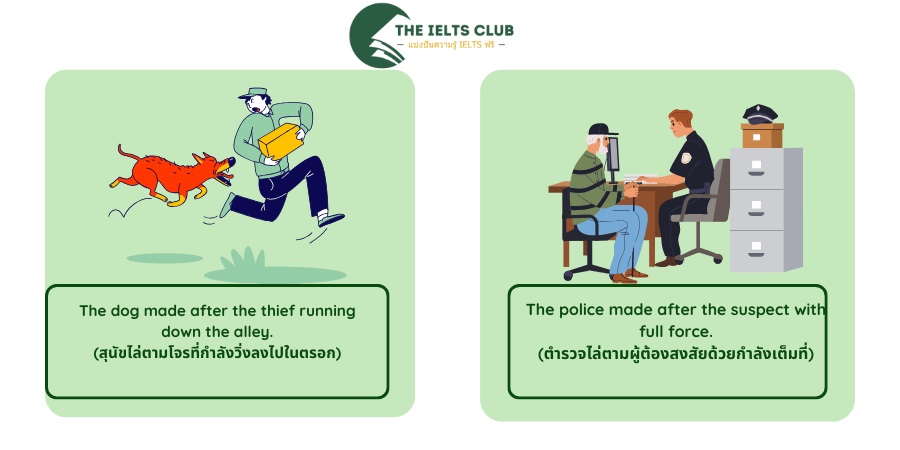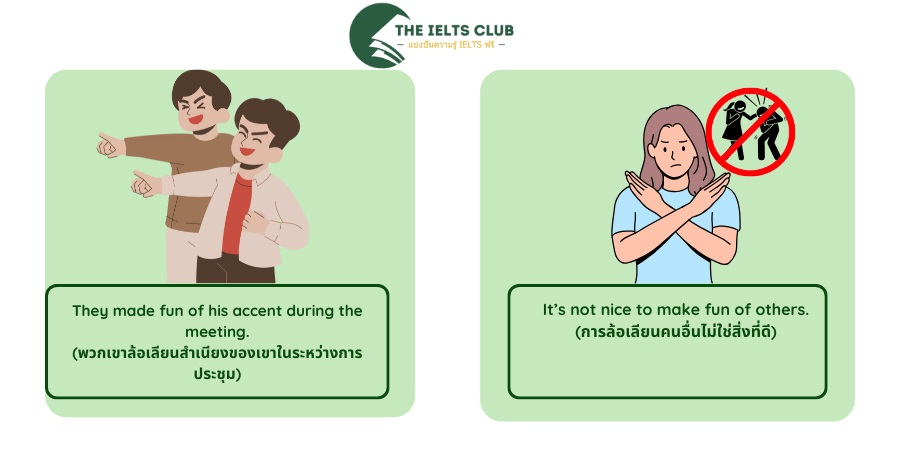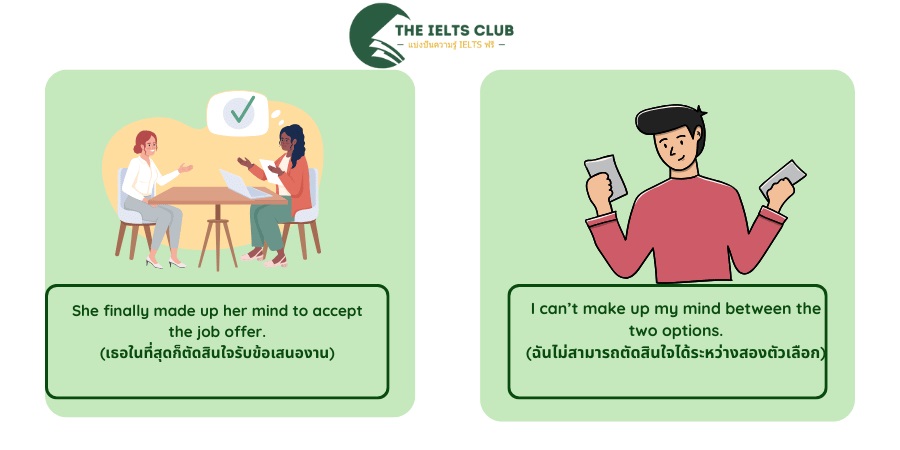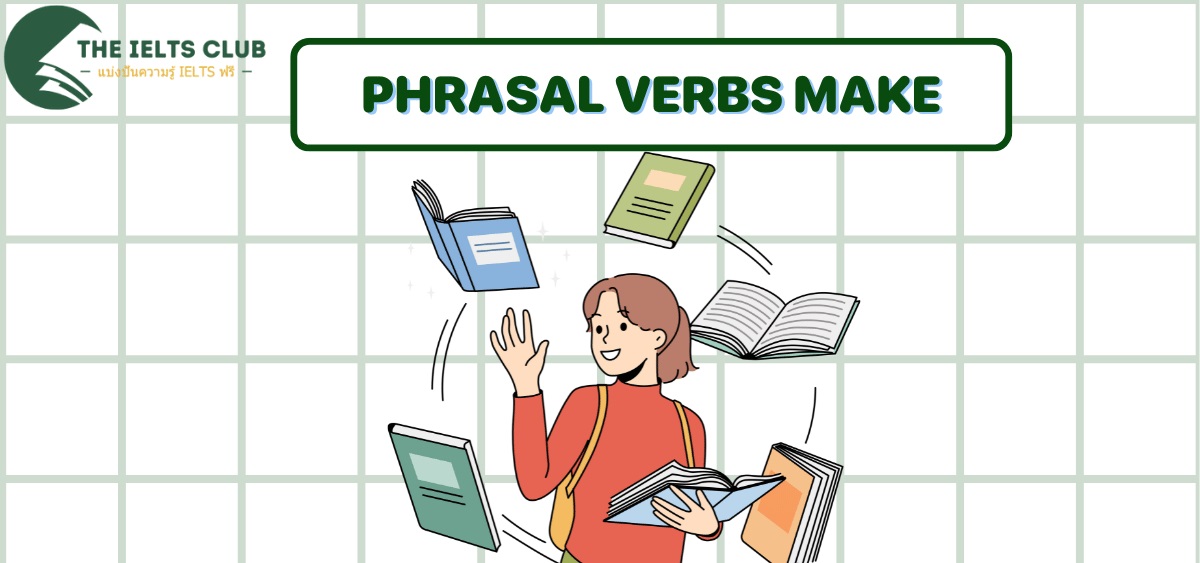เมื่อพูดถึงการเรียนภาษาอังกฤษ phrasal verbs นับเป็นความท้าทายสำหรับหลายคน โดยเฉพาะ Phrasal Verbs ที่มีคำว่า “make” ซึ่งมีความหมายที่หลากหลายและน่าสนใจ บทความนี้จะพาคุณไปทำความรู้จักกับ phrasal verbs เหล่านี้อย่างละเอียด
I. Phrasal Verbs Make คืออะไร?
คำว่า “Make” ในรูปแบบ Phrasal Verbs มีความสามารถพิเศษในการเปลี่ยนความหมายเมื่อรวมกับคำอื่น เช่น Make up, Make out, Make for ฯลฯ ซึ่งเป็นส่วนสำคัญของภาษาอังกฤษในการสื่อสารแบบเป็นธรรมชาติและเข้าใจลึกซึ้ง การเรียนรู้ Phrasal Verbs Make ไม่เพียงแต่ช่วยพัฒนาทักษะภาษาอังกฤษ แต่ยังช่วยเพิ่มความมั่นใจในการสื่อสารในสถานการณ์ต่าง ๆ อีกด้วย
II. 24+ Phrasal Verbs Make และตัวอย่างที่ใช้บ่อย
1. Make after
- ความหมาย: ไล่ตาม
- ตัวอย่าง:
- The dog made after the thief running down the alley.
(สุนัขไล่ตามโจรที่กำลังวิ่งลงไปในตรอก) - The police made after the suspect with full force.
(ตำรวจไล่ตามผู้ต้องสงสัยด้วยกำลังเต็มที่)
- The dog made after the thief running down the alley.

2. Make away with
- ความหมาย: ขโมย, หนีไปพร้อมกับ
- ตัวอย่าง:
- The burglars made away with the expensive paintings.
(โจรหนีไปพร้อมกับภาพวาดที่มีราคาแพง) - Someone made away with her purse at the market.
(มีคนขโมยกระเป๋าสตางค์ของเธอที่ตลาด)
- The burglars made away with the expensive paintings.
3. Make a go of something
- ความหมาย: พยายามให้สำเร็จ
- ตัวอย่าง:
- Despite the challenges, they made a go of their startup business.
(แม้จะมีอุปสรรค พวกเขาก็พยายามทำธุรกิจเริ่มต้นของตนให้สำเร็จ) - She’s determined to make a go of her career in acting.
(เธอมุ่งมั่นที่จะทำอาชีพนักแสดงของเธอให้สำเร็จ)
- Despite the challenges, they made a go of their startup business.
4. Make do with
- ความหมาย: ใช้สิ่งที่มีอยู่
- ตัวอย่าง:
- We’ll have to make do with these old chairs for now.
(เราต้องใช้เก้าอี้เก่าเหล่านี้ไปก่อนในตอนนี้) - She made do with a small kitchen in her apartment.
(เธอใช้ครัวเล็ก ๆ ในอพาร์ตเมนต์ของเธอ)
- We’ll have to make do with these old chairs for now.
5. Make for
- ความหมาย: มุ่งหน้าไป
- ตัวอย่าง:
- The ship made for the nearest harbor to avoid the storm.
(เรือมุ่งหน้าไปยังท่าเรือที่ใกล้ที่สุดเพื่อหลีกเลี่ยงพายุ) - He made for the door when he heard the alarm.
(เขามุ่งหน้าไปที่ประตูเมื่อได้ยินเสียงเตือนภัย)
- The ship made for the nearest harbor to avoid the storm.
6. Make fun of
- ความหมาย: ล้อเลียน
- ตัวอย่าง:
- They made fun of his accent during the meeting.
(พวกเขาล้อเลียนสำเนียงของเขาในระหว่างการประชุม) - It’s not nice to make fun of others.
(การล้อเลียนคนอื่นไม่ใช่สิ่งที่ดี)
- They made fun of his accent during the meeting.

7. Make it
- ความหมาย: ประสบความสำเร็จ, เอาชีวิตรอด
- ตัวอย่าง:
- She worked hard and finally made it as a doctor.
(เธอทำงานหนักและในที่สุดก็ประสบความสำเร็จในฐานะแพทย์) - They barely made it through the harsh winter.
(พวกเขาแทบจะเอาชีวิตรอดจากฤดูหนาวที่โหดร้ายได้)
- She worked hard and finally made it as a doctor.
8. Make it up to someone
- ความหมาย: ชดเชยให้ใครบางคน
- ตัวอย่าง:
- I’m sorry for missing your birthday. I’ll make it up to you.
(ฉันขอโทษที่พลาดวันเกิดของคุณ ฉันจะชดเชยให้คุณ) - She promised to make it up to him for forgetting their anniversary.
(เธอสัญญาว่าจะชดเชยให้เขาสำหรับการลืมวันครบรอบ)
- I’m sorry for missing your birthday. I’ll make it up to you.
9. Make out
- ความหมาย: เข้าใจ, มองเห็นชัดเจน
- ตัวอย่าง:
- I couldn’t make out what he was trying to say.
(ฉันไม่สามารถเข้าใจได้ว่าเขากำลังพยายามจะพูดอะไร) - Through the fog, we could barely make out the mountain.
(ผ่านหมอก เราแทบจะมองเห็นภูเขาได้ไม่ชัดเจน)
- I couldn’t make out what he was trying to say.
10. Make off with
- ความหมาย: ขโมยและหนีไป
- ตัวอย่าง:
- The robbers made off with a suitcase full of cash.
(โจรขโมยกระเป๋าเดินทางที่เต็มไปด้วยเงินสดและหนีไป) - Someone made off with my laptop while I was distracted.
(มีคนขโมยแล็ปท็อปของฉันไปในขณะที่ฉันเสียสมาธิ)
- The robbers made off with a suitcase full of cash.
11. Make oneself out (to be)
- ความหมาย: ทำตัวให้ดูเหมือน
- ตัวอย่าง:
- He makes himself out to be an expert, but he isn’t.
(เขาทำตัวให้ดูเหมือนเป็นผู้เชี่ยวชาญ แต่เขาไม่ใช่) - She tried to make herself out as the victim of the situation.
(เธอพยายามทำตัวเองให้ดูเหมือนเป็นเหยื่อในสถานการณ์นี้)
- He makes himself out to be an expert, but he isn’t.
12. Make out
- ความหมาย: เข้าใจ, มองเห็นชัดเจน
- ตัวอย่าง:
- I couldn’t make out the words on the faded sign.
(ฉันไม่สามารถมองเห็นคำบนป้ายที่เลือนรางได้) - Can you make out what he’s trying to say?
(คุณเข้าใจไหมว่าเขากำลังพยายามพูดอะไร?)
- I couldn’t make out the words on the faded sign.
13. Make over
- ความหมาย: เปลี่ยนแปลง, ปรับปรุง
- ตัวอย่าง:
- They made over their old house into a modern space.
(พวกเขาปรับปรุงบ้านเก่าให้เป็นพื้นที่ที่ทันสมัย) - She decided to make over her wardrobe with trendy clothes.
(เธอตัดสินใจเปลี่ยนแปลงตู้เสื้อผ้าของเธอด้วยเสื้อผ้าแฟชั่น)
- They made over their old house into a modern space.
14. Make towards
- ความหมาย: มุ่งหน้าไป
- ตัวอย่าง:
- The group made towards the park for a picnic.
(กลุ่มนี้มุ่งหน้าไปที่สวนสาธารณะเพื่อปิกนิก) - We made towards the nearest exit when the fire alarm went off.
(เรามุ่งหน้าไปยังทางออกที่ใกล้ที่สุดเมื่อเสียงเตือนภัยดังขึ้น)
- The group made towards the park for a picnic.
15. Make up
- ความหมาย: ประกอบ, ชดเชย, สมานฉันท์
- ตัวอย่าง:
- The team worked hard to make up for lost time.
(ทีมงานทำงานหนักเพื่อชดเชยเวลาที่เสียไป) - They argued for hours but eventually made up.
(พวกเขาโต้เถียงกันหลายชั่วโมง แต่สุดท้ายก็ดีกัน)
- The team worked hard to make up for lost time.
16. Make up for
- ความหมาย: ชดเชย
- ตัวอย่าง:
- He made up for his mistake by working overtime.
(เขาชดเชยความผิดพลาดของเขาด้วยการทำงานล่วงเวลา) - I hope this gift will make up for my absence.
(ฉันหวังว่าของขวัญนี้จะชดเชยการขาดหายไปของฉัน)
- He made up for his mistake by working overtime.
17. Make up with
- ความหมาย: คืนดีกับ
- ตัวอย่าง:
- After the fight, she made up with her best friend.
(หลังจากทะเลาะกัน เธอก็คืนดีกับเพื่อนสนิทของเธอ) - He wants to make up with his brother after the argument.
(เขาอยากจะคืนดีกับพี่ชายของเขาหลังจากการโต้เถียง)
- After the fight, she made up with her best friend.
18. Make up (your mind)
- ความหมาย: ตัดสินใจ
- ตัวอย่าง:
- She finally made up her mind to accept the job offer.
(เธอในที่สุดก็ตัดสินใจรับข้อเสนองาน) - I can’t make up my mind between the two options.
(ฉันไม่สามารถตัดสินใจได้ระหว่างสองตัวเลือก)
- She finally made up her mind to accept the job offer.

19. Make up the bed
- ความหมาย: จัดเตียง
- ตัวอย่าง:
- The hotel staff made up the bed with fresh linens.
(พนักงานโรงแรมจัดเตียงด้วยผ้าปูใหม่) - She made up the bed before the guests arrived.
(เธอจัดเตียงก่อนที่แขกจะมาถึง)
- The hotel staff made up the bed with fresh linens.
20. Make up a story
- ความหมาย: แต่งเรื่อง
- ตัวอย่าง:
- He made up a story to avoid getting into trouble.
(เขาแต่งเรื่องขึ้นมาเพื่อหลีกเลี่ยงปัญหา) - The child made up a funny story about a talking dog.
(เด็กคนนั้นแต่งเรื่องตลกเกี่ยวกับสุนัขพูดได้)
- He made up a story to avoid getting into trouble.
21. Make one’s eyes wide open
- ความหมาย: ทำให้ตกใจ, ประหลาดใจ
- ตัวอย่าง:
- The news made her eyes wide open in shock.
(ข่าวทำให้เธอตกใจอย่างมาก) - The unexpected gift made his eyes wide open with joy.
(ของขวัญที่ไม่ได้คาดคิดทำให้เขาประหลาดใจและดีใจ)
- The news made her eyes wide open in shock.
22. Make (something) into
- ความหมาย: เปลี่ยนบางสิ่งให้เป็น
- ตัวอย่าง:
- They made the old barn into a cozy café.
(พวกเขาเปลี่ยนโรงนาเก่าให้กลายเป็นคาเฟ่ที่อบอุ่น) - The artist made the clay into a beautiful vase.
(ศิลปินเปลี่ยนดินเหนียวให้กลายเป็นแจกันที่สวยงาม)
- They made the old barn into a cozy café.
23. Make a living
- ความหมาย: ทำมาหากิน
- ตัวอย่าง:
- She makes a living by selling handmade jewelry.
(เธอทำมาหากินโดยการขายเครื่องประดับทำมือ) - Many people make a living working online nowadays.
(หลายคนทำมาหากินโดยการทำงานออนไลน์ในปัจจุบัน)
- She makes a living by selling handmade jewelry.
24. Make great attempt (to do something)
- ความหมาย: พยายามอย่างหนัก
- ตัวอย่าง:
- He made a great attempt to learn a new language.
(เขาพยายามอย่างหนักที่จะเรียนรู้ภาษาใหม่) - The athletes made great attempts to break the record.
(นักกีฬาพยายามอย่างหนักที่จะทำลายสถิติ)
- He made a great attempt to learn a new language.

อ้างอิง: Phrasal Verbs Look
III. แบบฝึกหัด Phrasal Verbs Make
แบบฝึกหัดที่ 1: เติมคำในช่องว่าง
เลือกคำจากรายการ (Make after, Make up, Make for, Make do with, Make fun of)
- They had to ______ the old furniture as they couldn’t afford new ones.
- The kids started to ______ the quiet boy in the class.
- The travelers decided to ______ the nearest shelter during the storm.
- The police had to ______ the criminals escaping on a motorbike.
- She worked all night to ______ the lost hours during the day.
แบบฝึกหัดที่ 2: จับคู่ Phrasal Verbs กับความหมาย
จับคู่คำศัพท์ต่อไปนี้กับความหมายที่ถูกต้อง: (Make out, Make it up to, Make away with, Make for, Make fun of)
- ______: เข้าใจบางสิ่งที่ไม่ชัดเจน
- ______: มุ่งหน้าไปยังที่ใดที่หนึ่ง
- ______: ชดเชยให้ใครบางคน
- ______: ขโมยและหนีไป
- ______: ล้อเลียน
IV. วิธีการเรียนรู้ Phrasal Verbs Make ให้จำง่าย
- ฝึกใช้ในประโยคชีวิตประจำวัน: เช่น ใช้กับเพื่อนหรือในสถานการณ์ที่เกี่ยวข้องกับชีวิตจริง
- เขียนลงในสมุดบันทึก: สร้างตัวอย่างประโยคของตัวเองเพื่อช่วยจำ
- เล่นเกมคำศัพท์: เช่น เกมจับคู่หรือแบบฝึกหัดออนไลน์
- ทบทวนอย่างสม่ำเสมอ: ทบทวนคำศัพท์ทุกวันเพื่อช่วยให้จดจำได้นานขึ้น
การเรียนรู้ Phrasal Verbs Make จะช่วยให้คุณสื่อสารได้คล่องแคล่วและมีความมั่นใจในภาษาอังกฤษมากขึ้น อย่าลืมฝึกฝนบ่อย ๆ และนำไปใช้ในชีวิตประจำวันเพื่อพัฒนาทักษะอย่างต่อเนื่อง!











